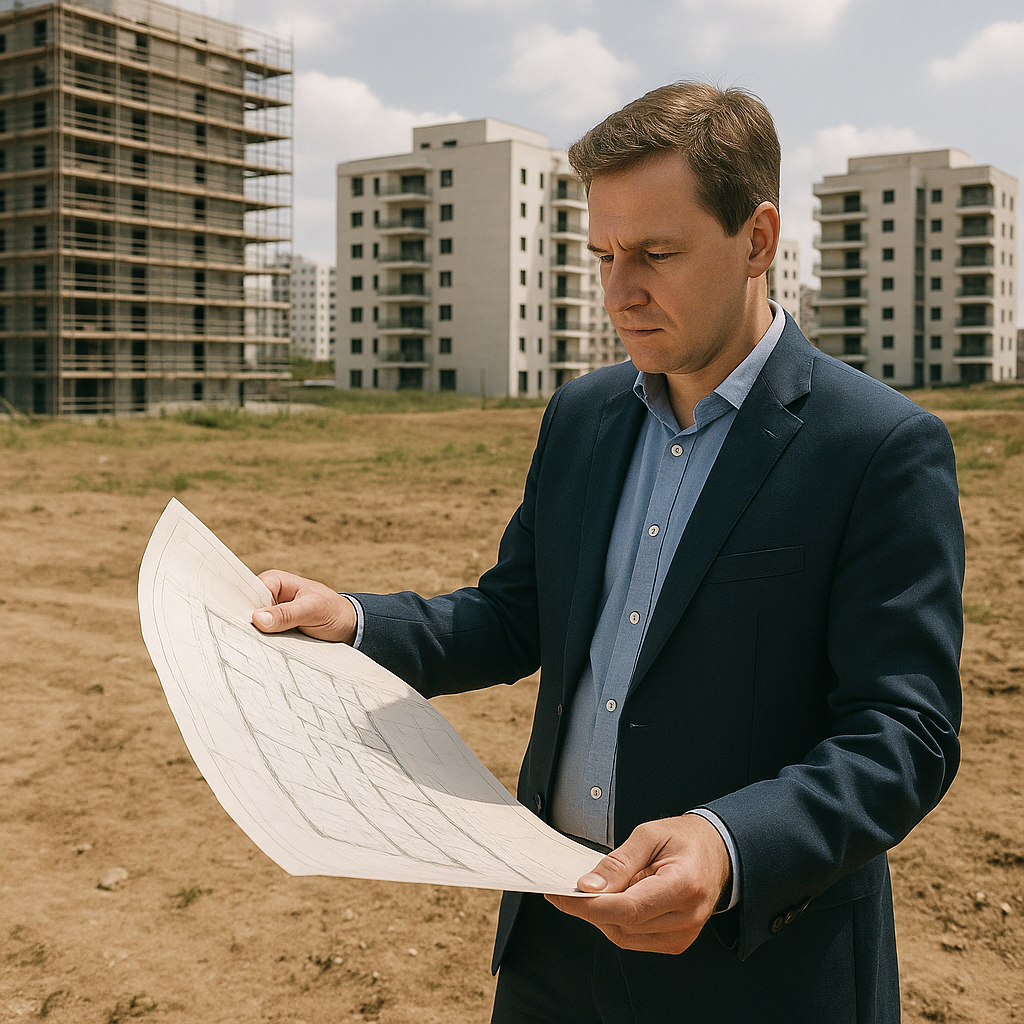Introduction
Investing in Israel’s off-plan (pre-construction) property market presents unique opportunities for foreign investors seeking to enter one of the Middle East’s most dynamic real estate markets. With strong historical appreciation, limited land availability, and a growing population, Israel offers compelling investment fundamentals. However, navigating this market requires understanding its distinct legal framework, market dynamics, and cultural nuances.
This comprehensive guide walks foreign investors through every aspect of purchasing off-plan properties in Israel, from market analysis to post-purchase considerations.
Understanding Israel’s Property Market Fundamentals
Market Overview
Israel’s property market has demonstrated remarkable resilience and growth over the past decades. Several key factors drive this market:
- Limited Land Supply: Israel’s small geographic size (approximately 22,000 km²) creates natural scarcity
- Strong Population Growth: Consistently growing at 1.5-2% annually
- Immigration Trends: The Law of Return continues to bring new citizens annually
- Robust Economy: Tech-driven economy with strong GDP growth
- Strategic Location: Bridging Europe, Asia, and Africa
Off-Plan Investment Benefits
Purchasing pre-construction properties in Israel offers several advantages:
- Lower Entry Prices: Typically 15-25% below completed property values
- Staggered Payment Schedules: Usually 20-30% down payment with installments tied to construction milestones
- Customization Options: Ability to select finishes and sometimes modify floor plans
- Value Appreciation: Potential for significant appreciation between purchase and completion
- New Building Standards: Modern earthquake regulations and energy efficiency
Regional Market Differences
Israel’s property market varies significantly by region:
- Tel Aviv: The most expensive market, favored by investors seeking premium rentals and appreciation
- Jerusalem: Strong religious and historical appeal with diverse submarkets
- Haifa: Northern port city with more affordable options and university demand
- Netanya: Coastal city popular with foreign buyers, especially French investors
- Beer Sheva: Southern city with growing tech presence and university
- Emerging Areas: Ashkelon, Ashdod, and other developing cities offering value opportunities
Legal Framework for Foreign Investors
Ownership Rights
Foreign investors can purchase most properties in Israel with minimal restrictions:
- No special permits required for most residential purchases
- Equal property rights to citizens in most circumstances
- Some restrictions may apply to properties on leased land (most Israeli land is owned by the state and leased for 49-99 years)
- Agricultural land has special restrictions
Required Documentation
Foreign investors should prepare:
- Valid passport
- Israeli taxpayer identification number (obtained easily)
- Proof of funds
- In some cases, documents from your home country with apostille certification
Tax Considerations
Understanding Israel’s tax structure is crucial:
- Purchase Tax: Progressive rates from 5-10% for non-residents
- Capital Gains Tax: 25% for foreign investors on property appreciation
- Rental Income Tax: Progressive rates up to 50%
- VAT (Ma’am): 17% on new properties (may be exempt for non-residents in certain cases)
- Municipal Property Tax (Arnona): Varies by municipality (even if property is vacant)
Foreign Exchange Regulations
Israel maintains liberal foreign exchange policies:
- No restrictions on bringing investment capital into Israel
- No restrictions on repatriating profits or capital
- Currency considerations as transactions are typically in Israeli Shekels (ILS)
- Banking documentation requirements for anti-money laundering compliance
The Off-Plan Purchase Process
Finding Suitable Projects
Begin your search through:
- Specialized real estate agencies catering to foreign investors
- Developer websites and marketing offices
- Real estate exhibitions in your home country
- Online property portals (Yad2, Homeless, etc.)
- Personal visits to development areas
Due Diligence Essentials
Thorough research should include:
- Developer Reputation: Track record, financial stability, completed projects
- Project Permits: Valid building permits and approvals (Form 4 approval history)
- Title Verification: Land registry checks (Tabu or Minhal status)
- Contract Review: By an attorney specializing in Israeli real estate
- Payment Schedule: Analysis of milestone-based payment structure
- Specifications: Detailed review of technical specifications and included features
- Neighborhood Analysis: Infrastructure plans, transportation links, amenities
- Market Comparables: Pricing analysis of similar completed properties
Key Contract Terms
Focus on these critical elements:
- Guaranteed Completion Date: With penalties for delays
- Technical Specifications: Detailed descriptions of all finishes and systems
- Modifications Policy: Parameters for buyer-requested changes
- Bank Guarantee: Securing your investment (required by Law of Sales)
- Index Linkage: How payments are adjusted for inflation
- Penalty Clauses: For both developer and buyer non-compliance
- Handover Procedures: Including inspection rights and remediation processes
- Maintenance Agreements: Initial period coverage and ongoing fees
The Sales Agreement Process
The typical purchase sequence:
- Initial Reservation: Often with a refundable deposit
- Draft Contract Review: Allow 7-14 days for attorney review
- Contract Signing: Usually at the developer’s sales office
- Initial Payment: Typically 20-30% of purchase price
- Bank Guarantee Issuance: Your security document
- Progress Payments: Tied to construction milestones
- Pre-Delivery Inspection: Identifying any defects
- Final Payment and Handover: Transfer of possession
- Registration: Property rights registration process
Financial Considerations
Financing Options
Funding possibilities include:
- Israeli Mortgages: Available to foreign investors at typically 50-60% LTV
- International Financing: Using assets in your home country
- Developer Financing: Sometimes available with higher interest rates
- Foreign Currency Considerations: Managing exchange rate risk
- Documentation Requirements: More extensive for non-residents
Hidden Costs
Budget for these additional expenses:
- Attorney Fees: 1-2% of purchase price
- Registration Fees: Approximately 0.5% of property value
- Foreign Currency Transfer Costs: Banking fees and exchange rate margins
- Property Insurance: Required from contract signing
- Property Management: 3-6% of rental income if applicable
- Utility Connections: One-time setup fees
- Furniture and Appliances: If purchasing unfurnished
Investment Return Analysis
Evaluate potential returns through:
- Rental Yield Calculations: Typically 2.5-4% gross for residential
- Appreciation Scenarios: Historical averages of 4-8% annually
- Tax Impact Assessment: Net return after all applicable taxes
- Currency Impact Planning: Historical exchange rate volatility
- Vacancy Assumptions: Market-specific occupancy rates
- Exit Strategy Options: Holding period scenarios and liquidity factors
Construction Monitoring and Quality Control
Progress Tracking
Stay informed through:
- Scheduled Site Visits: Arrange periodic inspections
- Construction Reports: Request regular updates from the developer
- Independent Supervision: Consider hiring a local engineer for milestone inspections
- Documentation: Maintain records of all communications and site conditions
- Milestone Verification: Before releasing progress payments
Common Construction Issues
Be vigilant about:
- Timeline Delays: Common in Israeli construction
- Specification Changes: Substitutions of materials or features
- Quality Variations: Differences in workmanship quality
- Unauthorized Modifications: Changes not agreed upon in contract
- Infrastructure Delays: Utilities or access roads not completed on time
Effective Management from Abroad
Strategies for distance management:
- Local Representative: Appoint someone to act on your behalf
- Digital Documentation: Ensure all communications are in writing
- Video Inspections: When personal visits aren’t possible
- Clear Communication Channels: Establish direct contact with project managers
- Cultural Awareness: Understanding Israeli business communication styles
Post-Completion Considerations
Property Registration
Completing your ownership process:
- Tabu Registration: Final property registry process
- Power of Attorney: Often needed for foreign buyers
- Documentation Requirements: Various certificates and clearances
- Timeframe Expectations: Often 1-2 years after completion
- Registry Fees: Based on property value
Property Management
Options for maintaining your investment:
- Full-Service Management: Comprehensive handling of all aspects
- Tenant-Only Management: Finding and managing renters only
- Self-Management: Challenges and requirements for foreign owners
- Service Level Agreements: What to expect and demand
- Cost Structures: Fee models and typical charges
Rental Market Navigation
Understanding the rental landscape:
- Target Markets: Local vs. expatriate tenants
- Lease Structures: Typical terms and conditions
- Rental Processes: Finding and screening tenants
- Legal Protections: Landlord rights and limitations
- Seasonal Factors: Market timing considerations
- Furnished vs. Unfurnished: Market preferences
Exit Strategy Planning
Preparing for eventual sale:
- Optimal Holding Periods: Tax and market considerations
- Marketing Channels: Local vs. international promotion
- Timing Considerations: Seasonal and market cycle factors
- Tax Planning: Minimizing capital gains impact
- Repatriation Procedures: Getting your money home efficiently
Risks and Mitigation Strategies
Market Risks
Potential challenges include:
- Price Volatility: Historically less than other markets but present
- Currency Fluctuations: ILS/USD/EUR exchange rate risks
- Political Uncertainty: Regional security situation
- Regulatory Changes: Property and tax law modifications
- Interest Rate Environment: Impact on financing and valuation
Developer Risks
Protecting against construction issues:
- Bank Guarantees: Understanding and enforcing your legal protections
- Insurance Requirements: Construction and liability coverage
- Contractual Safeguards: Effective penalty clauses
- Legal Recourse: Dispute resolution mechanisms
- Developer Financial Stability: Ongoing monitoring
Legal and Regulatory Risks
Navigating changing requirements:
- Tax Policy Changes: Historical patterns and protection strategies
- Foreign Ownership Regulations: Potential modifications
- Building Code Updates: Impact on in-progress projects
- Zoning Changes: Effects on property value and use
- Environmental Regulations: Emerging requirements
Cultural and Practical Challenges
Overcoming operational hurdles:
- Language Barriers: Documentation and communication strategies
- Business Culture Differences: Negotiation and relationship expectations
- Time Zone Management: Coordinating across distances
- Local Networks: Building essential professional relationships
- Information Asymmetry: Accessing accurate market data
Case Studies and Success Strategies
Profile: Tel Aviv Luxury Development
Analysis of a successful high-end project:
- Initial purchase: 2018 at 35,000 ILS/m²
- Completion: 2021 at 45,000 ILS/m²
- Key success factors: Prime location, premium specifications, strong developer
- Challenges overcome: Construction delays, specification disputes
- Current rental yield: 3.2% gross
Profile: Jerusalem Urban Renewal Project
Examination of an urban transformation investment:
- Pinui-Binui (evacuation-reconstruction) project structure
- Risk factors and mitigation strategies
- Timeline extension considerations
- Final outcome and lessons learned
Profile: Secondary Market Value Play
Analysis of a regional city investment:
- Entry price advantages versus central locations
- Infrastructure-driven growth strategy
- Longer holding period requirements
- Higher yield potential trade-offs
Common Success Patterns
Recurring themes among successful investors:
- Local Team Assembly: Building relationships with trustworthy professionals
- Patient Capital Approach: Realistic timeline expectations
- Value-Add Opportunities: Strategic improvements to increase returns
- Diversification Strategies: Spreading risk across property types or locations
- Timing Advantages: Market cycle awareness
Resources and Professional Network Building
Essential Professional Contacts
Building your Israeli real estate team:
- Real Estate Attorney: Specializing in foreign transactions
- Accountant: Familiar with non-resident taxation
- Mortgage Broker: Experienced with foreign buyer financing
- Property Manager: If planning rental investment
- Independent Engineer/Inspector: For construction monitoring
Information Sources
Reliable research resources:
- Government Data: Central Bureau of Statistics (real estate trends)
- Industry Reports: Major banks and real estate companies
- Professional Associations: Israel Real Estate Association
- Foreign Investor Forums: Online communities and networking groups
- English-Language Publications: Israeli business newspapers with property sections
Networking Opportunities
Building valuable connections:
- Real Estate Conferences: Annual events in major cities
- Developer Presentations: Often held internationally
- Israeli Chambers of Commerce: In your home country
- Professional Webinars: Online educational opportunities
- Social Media Groups: Specialized property investment communities
Conclusion
Israel’s off-plan property market offers significant opportunities for foreign investors willing to navigate its unique characteristics. Success requires thorough research, professional guidance, cultural understanding, and strategic planning. By following the comprehensive approach outlined in this guide, foreign investors can minimize risks and maximize the potential benefits of this dynamic market.
The combination of strong fundamentals, legal protections, and diverse regional options makes Israel an attractive consideration for international real estate portfolio diversification. While challenges exist, they can be effectively managed with the right preparation and professional support network.
Disclaimer: This guide provides general information for educational purposes only and should not be construed as legal, financial, or investment advice. Laws, regulations, and market conditions change over time. Consult qualified professionals before making investment decisions.

